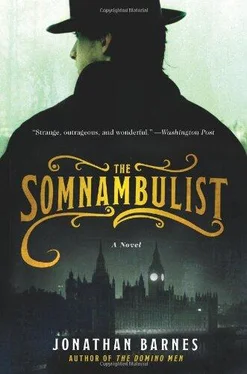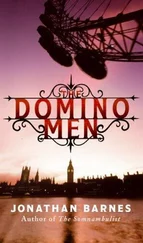Jonathan Barnes - The Somnambulist
Здесь есть возможность читать онлайн «Jonathan Barnes - The Somnambulist» весь текст электронной книги совершенно бесплатно (целиком полную версию без сокращений). В некоторых случаях можно слушать аудио, скачать через торрент в формате fb2 и присутствует краткое содержание. Жанр: Иронический детектив, Исторический детектив, на английском языке. Описание произведения, (предисловие) а так же отзывы посетителей доступны на портале библиотеки ЛибКат.
- Название:The Somnambulist
- Автор:
- Жанр:
- Год:неизвестен
- ISBN:нет данных
- Рейтинг книги:5 / 5. Голосов: 1
-
Избранное:Добавить в избранное
- Отзывы:
-
Ваша оценка:
- 100
- 1
- 2
- 3
- 4
- 5
The Somnambulist: краткое содержание, описание и аннотация
Предлагаем к чтению аннотацию, описание, краткое содержание или предисловие (зависит от того, что написал сам автор книги «The Somnambulist»). Если вы не нашли необходимую информацию о книге — напишите в комментариях, мы постараемся отыскать её.
The Somnambulist — читать онлайн бесплатно полную книгу (весь текст) целиком
Ниже представлен текст книги, разбитый по страницам. Система сохранения места последней прочитанной страницы, позволяет с удобством читать онлайн бесплатно книгу «The Somnambulist», без необходимости каждый раз заново искать на чём Вы остановились. Поставьте закладку, и сможете в любой момент перейти на страницу, на которой закончили чтение.
Интервал:
Закладка:
“It was she who told us of you.”
Love seemed not to have heard. “I was a lad of eight or nine when I met him, from a humble family, a harum-scarum youth, no great shakes at my studies and always with an eye on making money. The Gillmans took me on from time to time as an errand boy — odd jobs, little chores and suchlike.” Another swig of whisky. “I’d worked there a month before I met the poet. He lived upstairs in the garret room and more often than not he kept to his bed. You have to appreciate that by this time he was almost completely addicted to opium. Gillman had done everything in his power to curb the craving, but so far as I could see it never came to anything. The old man was completely in thrall to the stuff, and it was his need for the poison which first drew me to him. I’d been carrying out some minor task or other for the doctor’s wife when Coleridge called me upstairs. He had an errand for me, he said, and would pay handsomely for it. He ordered me to hurry down to the shop and buy what he referred to as his ‘prescription.’ He’d never call it by its real name, you understand. He was almost superstitious about that. Anyway, I did as I was asked. Gillman turned a blind eye, the old man got what he wanted and we all of us were happy. It became a regular arrangement, and over time the poet and I grew friendly, became pals. He loved to talk, you see — he was a great man for a chat — and I was his favorite audience.” Love sighed. “The things he told me. When I knew him he was close to death, but still he enraptured. How he must have been at the height of his powers I cannot imagine.” Another retreat to the whisky bottle.
“He spoke of the adventures of his youth, of his disastrous spell in the army, of his time at university where he conjured up the ghost of Thomas Gray. Oh, he could spin a yarn. Of course, I knew they were exaggerated like as not, embroidered for effect, but still I lapped them up. What boy wouldn’t? He even took me on holiday. We walked together on the beach at Ramsgate. But what he spoke of most of all was an old dream, something he had imagined as a young man with his best and closest friends. Pantisocracy. That was what they called it. No doubt you’ve heard the name?”
Moon inclined his head to suggest that he had not.
“It was a scheme of enormous audacity, an experiment, he said, in human perfectability. There were twelve of them, fresh from the university. They planned to create the perfect society, to quit England and live in America on the banks of the Susquehanna in absolute self-sufficiency. It was to be a utopia based equally upon agriculture and poetry. They thought they’d discuss metaphysics as they chopped wood, criticize verse as they hunted buffalo, write sonnets whilst they followed the plough.” Love laughed, all but clapping his hands in glee. “Wonderful! Quite, quite perfect.”
“It sounds admirable,” Moon said briskly. “If a little idealistic.”
“Ah, well, there you have it. That’s the rub. It could never have worked. They fell out over money, weren’t able to raise enough capital to make the trip. The whole project was abandoned.”
“I’m afraid I have yet to see a connection with the firm.”
“The abject failure of Pantisocracy had become the old man’s greatest regret, and toward the end it came to dominate his thoughts above all other things. He felt he had squandered his only opportunity to change the world for the better. And as we grew closer, the old man somehow got hold of the notion that I was his successor, that I’d be the one to succeed where he had failed — that I would revive Pantisocracy. I knew he was dying, of course, so I did the decent thing and told him what he wanted to hear — that I would do everything I could to carry out the plan, that I’d move to America and live out his fantasy. All bunkum as far as I was concerned but if it made a dying man happy I reckoned it could do no harm. What I didn’t realize was this: Coleridge was not a rich man, but most of what he possessed was placed in my care for me to do with as I would when I eventually came of age. It’s only due to the old man’s generosity that I was able to go to one of the universities. The remainder, he said, should go to the formation of a company dedicated to the resurrection of his Pantisocratic dream. In his will he insisted that I name it after myself. I can see you wondering, Mr. Moon. There are four Loves in the title. Time was, I had sons of my own.” At this mention of his family, he reached again for the bottle.
“I graduated with a good degree and found, much to my astonishment, that I had a way with figures. I did as I’d been told and established the company according to Mr. Coleridge’s instructions. But I could muster little interest in Pantisocracy, and whilst the firm ostensibly remained loyal to his intentions, I was able to make a good deal of money over the years by investing in property and playing the markets. At the peak of our success, I employed nearly a hundred staff and enjoyed considerable profits.”
“You betrayed the ideals of your benefactor for the sake of money.”
Love seemed upset. “Harsh words, Mr. Moon. Very harsh. You have to understand that the old man was very ill when he died. Some might say not quite in his right mind. I did what I was able with my inheritance and doubled it — doubled it dozens of times over. I’m not a selfish or avaricious man. I was generous with our earnings. There was a time when I was one of the most prominent philanthropists in London. I did feel guilty. But a few thousand a year will help a man forget his duty.”
“So what happened?”
“Five years ago, the golden times had passed. I’d got too old to run the company, and, like me, it had grown somewhat decrepit. None of my boys showed any real interest in succeeding me, and I was at my wits’ end as to what to do when I was approached by a consortium. They were men of God, they said, representatives of an organization called the Church of the Summer Kingdom. I see you recognize the name. So did I, as it happens, since I had donated money to their cause on more than one occasion. Their names were most improbable — Donald McDonald and the Reverend Doctor Tan. They said they were devotees of Mr. Coleridge, said they venerated the man and were almost embarrassing in their effusive deference to me — one of the last men alive, they said, who had actually known the poet personally. They knew all about the will, about the old man’s plans for the company, and they made me an offer. They promised to keep the firm operating exactly as it was, to retain all my staff and instate me as Chairman Emeritus on the one condition that we return to Coleridge’s original intentions. They actually planned in the fullness of time to live as Pantisocrats. It was an old man’s weakness and no doubt you’ll think me foolish, but I took them at their word. I see now that they were silver-tongued rogues, but I had wearied of the place and I felt guilty, so I allowed them some measure of power. It seemed the right thing to do.”
“Let me guess,” Moon said. “The church took absolute control of the company and ousted you.”
“They threw me out onto the street. I thought the only path left to me was one of meditation and repentance. And so you find me like this, an unsuccessful anchorite.”
“Could you not appeal? Surely the company still belonged to you?”
“They had clever lawyers. In my stupidity I had signed documents which gave them complete control. I admit it — I was thoroughly gulled. Cuckoos, Mr. Moon. Cuckoos in the nest. And my boys were under their spell. I was told they took part in my downfall, though I can’t bring myself to believe it. Can you blame me for hiding myself here?” He reached again for the whisky bottle. And drained it dry.
Читать дальшеИнтервал:
Закладка:
Похожие книги на «The Somnambulist»
Представляем Вашему вниманию похожие книги на «The Somnambulist» списком для выбора. Мы отобрали схожую по названию и смыслу литературу в надежде предоставить читателям больше вариантов отыскать новые, интересные, ещё непрочитанные произведения.
Обсуждение, отзывы о книге «The Somnambulist» и просто собственные мнения читателей. Оставьте ваши комментарии, напишите, что Вы думаете о произведении, его смысле или главных героях. Укажите что конкретно понравилось, а что нет, и почему Вы так считаете.












